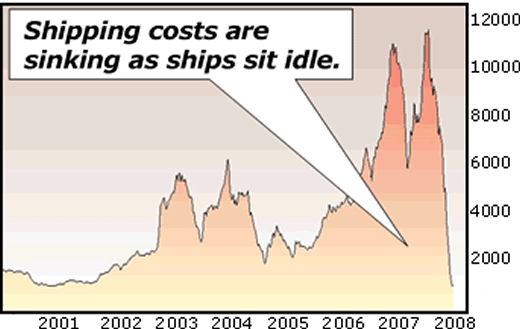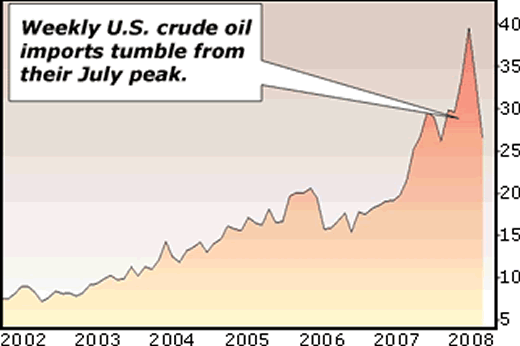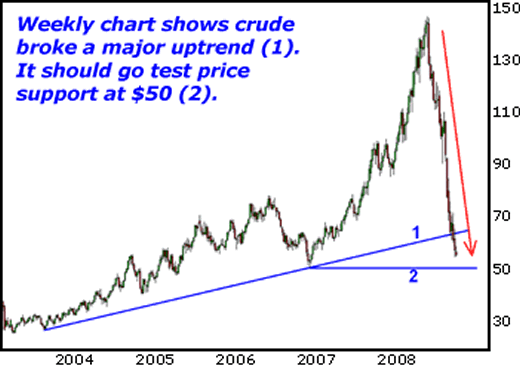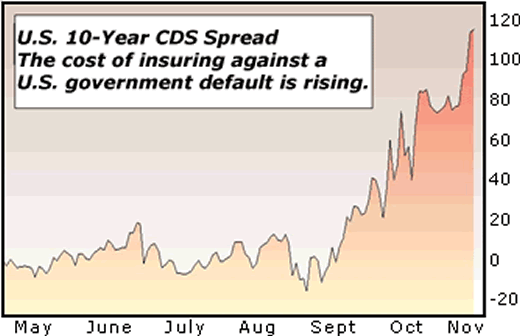What's Frightening Saudis and Iranians into Buying Gold?
Commodities / Gold & Silver Nov 19, 2008 - 01:17 PM GMT Sean Brodrick writes: Our oil-rich friends in the Middle East are scared. How do I know? Because they are buying gold like crazy!
Sean Brodrick writes: Our oil-rich friends in the Middle East are scared. How do I know? Because they are buying gold like crazy!
First , we got the news that Saudi investors spent $3.47 BILLION on gold in a recent two-week period. On a ratio-to-GDP basis, that's like investors in the U.S. spending $131 BILLION.
Why are they doing this? The only explanation I've heard is that the Saudis are turning to gold as a safe haven in the midst of the global financial crisis. And since the financial crisis kicked into high gear in August … something must be scaring them quite a bit more right now.
Second , Reuters reports that Iran is converting some of its foreign currency reserves to gold. Iran has $120 billion in foreign currency reserves … there's no details on just how much was shoveled into the yellow metal.
 |
| Gold dealers in Dubai reported running low on gold during the recent Indian holiday, the Festival of Lights, a traditional time for Indians to buy gold. |
Third , gold dealers in Dubai reported running low on gold during the recent Indian holiday, the Festival of Lights, a traditional time for Indians to buy gold. More than 50% of the population of Dubai originally comes from India. And about 20% of the world's gold is traded in Dubai.
The world is in the grip of economic hard times — over 40 countries are officially in a recession. Japan just joined that unhappy club. And the euro-zone nations are already there. We also know that the forces moving the market now seem to be deflationary, not inflationary. That means the value of the U.S. dollar is going up, and the price of gold is trending lower.
But could our friends in the Middle East be thinking beyond the current deflationary spiral? Gold is traditionally a hedge against calamity. So I ask again, what are the oil sheiks afraid of?
While gold prices are going lower in the short-term as deflationary forces tighten their grip, there are also longer-term forces that are quite bullish for gold …
- Chinese investors' demand for gold is rising. Investment demand hit 38.4 metric tonnes in the first nine months of this year against 24 tonnes for the whole of 2007.
- Demand for gold jewelry in China reached 241.6 tonnes in the first nine months of 2008, compared with 302 tonnes for all of 2007, when gold jewelry demand grew by 26%. China is the world's second-largest gold consumer.
- Sources in the Indian market and preliminary data on Indian imports point to a strong revival in Indian jewelry demand during this year's third quarter.
- In South Africa, gold mining output plunged 17.7% in September compared to a year earlier.
- Global mine production of gold declined by 4% year-on-year in the second quarter to 590 tonnes, bringing output in the first half the year to 1,133 tonnes, 6% below the same period a year earlier.
Still, this long-term good news is cold comfort when prices are trending lower in the short-term. So it must be other things driving the Saudis and Iranians into gold. For example …
 |
The Collapse of the Global Cargo Trade
The Baltic Dry Index sounds like a weather report, but what it really does is track the price of shipping bulk cargo — such as coal, iron ore, cotton and grain. And recently, the Baltic Dry Index has fallen through the floor.
In real dollar terms, at the peak of the market, a 170,000-tonne Capesize bulk carrier cost $234,000 to rent. Recently, it was $5,600 — that's a crash of over 90%.
Why is this happening?
Two reasons …
- The falling demand for products like cars. Auto sales are falling in the U.S., Germany, France, Japan and more. The pace of car sales growth is also slowing down in China.
- International shipping works on “letter of credit.” These financial guarantees are issued to buyers of bulk cargo by their banks. This system has greased the wheels of global trade for the last 400 years. With the collapse of the credit market — and banks now sitting on their hands, refusing to lend — the wheels of global shipping are grinding to a halt.
How bad is this?
Peter Kerr-Dineen, chairman of Howe Robinson shipbrokers, didn't mince words when he described the crisis to the British press:
“This is a nuclear bomb in the freight market and in world trade. Liquidity has to return because if there is insufficient money to provide standard finance, world trade will be sharply cut back and economic growth will implode.”
Or as the London Banker blog put it:
“If cargo trade stops, a whole lot of supply chain disruption starts. If the ore doesn't go to the refinery, there is no plate steel. If the plate steel doesn't get shipped, there is nothing to fabricate into components. If there are no components, there is nothing to assemble in the factory. If the factory closes the assembly line, there are no finished goods. If there are no finished goods, there is nothing to restock the shelves of the shops. If there is nothing in the shops, the consumers don't buy. If the consumers don't buy, there is no Christmas.”
 |
| World trade has collapsed because the demand for goods has plummeted and available credit has dried up. |
In my view … and perhaps the view of the Saudis who are buying gold … there is an even worse risk .
If bulk shippers can't buy cargoes, then a lot of U.S. grain could end up rotting in warehouses while big portions of the world go hungry.
The Saudis, by the way, are the biggest importer of food in the Middle East. They probably have the money to pay cash for their food shipments.
But for the approximately 2.7 billion people in the world who spend 80% of their income on food, a disruption in the global shipping trade could mean the difference between quiet poverty and all-out rioting.
In addition, the Saudis are also worried about …
The Collapse of U.S. Oil Imports
The oil producers are used to a world where U.S. oil imports always go up. But that world has been turned on its head. In September, crude oil imports dropped to 8.4 million barrels per day, down a whopping 16.5% from the average of 10.1 million barrels registered a year earlier.
 |
This is helping the U.S. trade deficit, but for all the wrong reasons. I've often said the way to get lower oil prices is through conservation. Now though, Americans are being forced to conserve by economic hardship.
And since the U.S. uses one-fourth of the world's oil, our falling imports are a major driver of cratering oil prices …
There is strong support for oil at $50. But you know that the Saudis, Iranians, Venezuelans and other OPEC heavyweights made their budget plans based on much higher prices. And cheap oil means the only way they can make up revenue is by pumping more oil … which should weigh on prices even more.
Looking forward, it gets worse for the oil producers …
 |
Just last week, the Energy Information Agency projected that OPEC could earn $595 billion in 2009. That's way, way down from projections of $979 billion of net oil export revenues in 2008, and even lower than the $671 billion it earned in 2007.
Saudi Arabia earns 29% of OPEC's total revenues. If their revenues go back to 2006 levels, what will that do to the political situation in a country that is already sitting on a fundamentalist Islamic powder keg?
Yeah, that might be a really good reason for the Saudi fat-cats to buy gold!
These are just two of the world-class problems that may be scaring Middle East investors into gold.
I could go on. There are plenty of good reasons people might want to buy gold. Sure, deflation is putting downward pressure on gold … on paper. But just try buying physical gold anywhere near the paper price.
Pricing in a Government Default?
While gold is traditionally a haven of safety, that's not how it played out over the past couple months. Instead, we saw risk-adverse investors dump gold along with other asset classes and flee to the safety of cash.
Maybe the mighty dollar has more upside. But remember that the U.S. dollar is backed by “the full faith and credit of the U.S. government.”
Do you have a lot of faith in the U.S. government? I'd say the faith of the world has been shaken by recent events.
And apparently I'm not the only one who thinks that. Take a look at my next chart, which shows the 10-year credit default swap spread on U.S. Treasuries — a form of insurance contract against issuer default.
 |
The cost of insuring against a U.S. government default is soaring. And similar trends exist in the bond markets of Germany and Britain.
I think this is because investors are pricing in the massive bailouts that central banks are throwing at their markets. For instance, the U.S. bailouts will add enormously to our country's already staggering national debt. According to CNBC data, the cost of all the bailouts that have been going on for months has now hit a total of $4.2 TRILLION!
In fact, Morgan Stanley recently estimated that the 2009 fiscal deficit in the U.S. would reach 12.5%. That's more than twice the previous record of 6% set in 1983.
As a percentage of GDP, the U.S. national debt should pass 70% next year. That's lower than the 122% at the end of World War II. Yet we aren't fighting World War II, are we? That ended rather abruptly — this crisis won't. And the odds are our fiscal picture will get worse, not better.
Under the circumstances, maybe investors in Saudi Arabia and Dubai may just be ahead of the curve. Maybe having some gold — the ultimate safe haven against troubled times — is the right thing to do.
I'm not saying the U.S. government is going to default … I'm saying the possibility of that happening could be priced in more ways than one. And that's the kind of environment where gold could really shine.
Consider Buying Gold on Dips … And Hold for a Wild Ride
Physical gold is always nice. But exchange-traded funds have made gold buying a lot easier.
I'm talking about the SPDR Gold Shares ETF (GLD) and the Barclays iShares Comex Gold Trust (IAU). They are fixed at 1/10th the price of gold, minus a small amount to account for fees.
That means if gold is trading at $730 an ounce, you can buy the GLD or the IAU for about $73. And they are backed up by gold bullion in a vault.
There are scary forces on the march in the global economy. A little golden insurance may help you sleep a whole lot better.
All the best,
Sean
This investment news is brought to you by Money and Markets . Money and Markets is a free daily investment newsletter from Martin D. Weiss and Weiss Research analysts offering the latest investing news and financial insights for the stock market, including tips and advice on investing in gold, energy and oil. Dr. Weiss is a leader in the fields of investing, interest rates, financial safety and economic forecasting. To view archives or subscribe, visit http://www.moneyandmarkets.com .
Money and Markets Archive |
© 2005-2022 http://www.MarketOracle.co.uk - The Market Oracle is a FREE Daily Financial Markets Analysis & Forecasting online publication.



